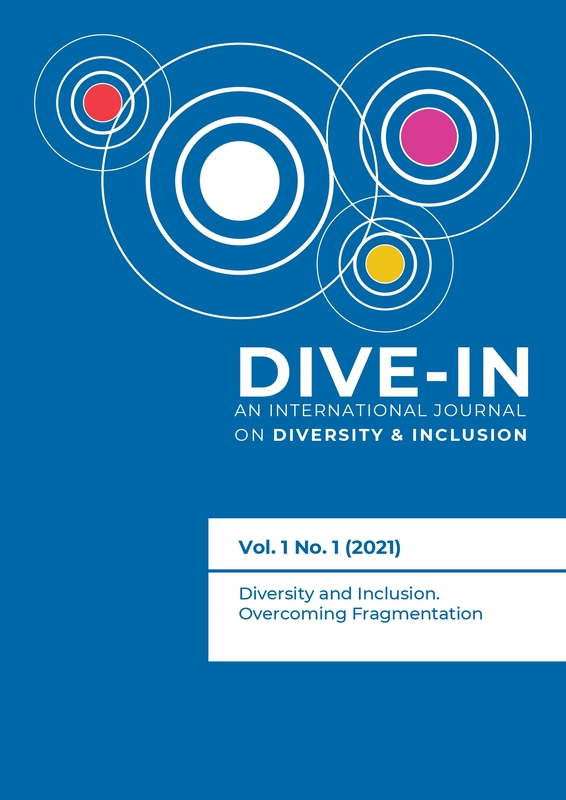Dialoguing with Diversity: Towards an inclusive and egalitarian society
DOI:
https://doi.org/10.6092/issn.2785-3233/13891Keywords:
critical dialogue, diversity and difference, diversity and inclusion, marginalization and inequality, intersectionality, public pedagogyAbstract
‘Diversity and inclusion’ has been widely recognized as a key principle to be promoted by institutions, corporations and administrations across the world. Yet actual promotion of diversity does not necessarily enhance egalitarian inclusion of marginalized people. It might operate to manage and/or tame differences in society and foster particular kinds of diversity—business-centered, expedient and pleasurable ones—while suppressing others. Through critical appraisal of the discourse and practice of the promotion of diversity, this paper will discuss several ways in which the apparent embracement of diversity deters the advancement of the tackling of lingering inequality and marginalization with some attention to the Japanese situation. Such critique does not negate the significance of diversity and inclusion, but on-going critical dialogue with diversity is indispensable to positively and productively advance and implement the inclusion of diversity towards the construction of egalitarian inclusive society.
References
“Code of Conduct of Diversity 2.0.” Ministry of Economy, Trade and Industry, March 2017. Revised June 2018. https://www.meti.go.jp/press/2018/06/20180608001/20180608001-3.pdf
“Diversity ABC to learn from scratch. How Companies Should Face Diversity.” Fujitsu Journal, 19 December 2017. https://blog.global.fujitsu.com/jp/2017-12-19/01/
“Hate lurking in our everyday life: Is Japan really a discrimination-free society?”. Mainichi Newspaper, 12 February 2021. https://mainichi.jp/articles/20210212/k00/00m/040/027000c
“How corporations should commit themselves to social issues.” Visual Shift, 26 November 2020. https://visual-shift.jp/20728/
Ahmed, Sara. 2012. On Being Included: Racism and Diversity in Institutional Life. Durham: Duke University Press.
Ahmed, Sara. 2016. “An Affinity of Hammers.” TSQ: Transgender Studies Quarterly 3(1-2). 22-34.
Brown, Wendy. 2008. Regulating Aversion: Tolerance in the Age of Identity and Empire. Princeton: Princeton University Press.
Case, Kim (ed.). 2013. Deconstructing Privilege: Teaching and Learning as Allies in the Classroom. New York: Routledge.
Collins, Patricia H. & Chepp, Valerie. 2013. “Intersectionality.” In Waylen, Georgina & Celis, Karen & Kantola, Johanna & Weldon, S. Laurel (eds.), Oxford Handbook of Gender and Politics, 57-87. New York: Oxford University Press.
Collins, Patricia H. 1990. Black Feminist Thought: Knowledge, Consciousness, and the Politics of Empowerment. Boston: Unwin Hyman.
Crenshaw, Kimberle. 1988. “Demarginalizing the Intersection of Race and Sex: A Black Feminist Critique of Antidiscrimination Doctrine, Feminist Theory and Antiracist Politics.” University of Chicago Legal Forum 140. 139-167.
Eriksen, Thomas Hylland. 2006. “Diversity Versus Difference: Neo-liberalism in the Minority-Debate”. In Rottenburg, Richard & Schnepel, Burkhard & Shimada, Shingo (eds.), The Making and Unmaking of Difference, 13-36. Bielefeld: Transcript.
Folarin, Amina. 2020. “Stop confusing BLM and D&I. They are not the same thing: Businesses are missing their opportunities to change.” Campaign, 19 June 2020, https://www.campaignlive.co.uk/article/stop-confusing-blm-d-i-not-thing/1687008.
Hage, Ghassan. 1998. White nation: fantasies of white supremacy in a multicultural society. Annandale: Pluto Press.
Hatano, Lilian Terumi. 2006. “Zainichi Burajirujin wo Torimaku ‘tabunka kyôsei’ no shomondai.” (“Issues of Multicultural Co-living for Japanese Brazilians”). In Ueda, Kôji & Yamashita, Hitoshi (eds.), Kyôsei no naijitsu: Hihanteki shakaigengogaku kara no Toikake (‘Debunking “Coliving”: Appraisal from a Viewpoint of Critical Social Linguistics’), 55-80. Tokyo: Sangensha.
Iwabuchi, Koichi. 2010. “Tabunkashakai Nihon ni okeru bunka notoi” (“What is the cultural questions of Japan as a multicultural society”). In Iwabuchi, Koichi (ed.), Tabunkashakai no bunka wo tou: kyousei, komyuniti, media (‘Interrogating “cultural” issues of multicultural society: Co-living, community and media’), 9-34. Tokyo: Seikyusha.
Iwabuchi, Koichi. 2017. “Introverted jingoism in a post-imagined-community digital era: The Upswing of Hate Speech Demonstration in Japan.” In Wang, Chih-Ming & Goh, Daniel PS (eds.), Precarious Belongings: Affect and Nationalism in Asia, 39-55. London: Rowman & Littlefield.
Iwabuchi, Koichi. 2018. “Migrancy and Diplomacy: Fostering Cross-Border Dialogue and Collaboration in the Age of Hyper-Mobility.” The Brown Journal of World Affairs 25(1). 165-178.
Kajita, Takamichi & Tanno, Kiyoto & Higuchi, Naoto. 2005. Kao no mienai teijûka: Nikkei Burajirujin to kokka, sijou, imin nettowâku (‘Invisible Settlement: Japanese Brazilians and the State/Market/Migrant Networks’) Nagoya: Nagoya University Press.
Mochizuki, Yudai. 2019. Futatsu no Nihon: Imin kokka no honnne to tatemae (‘Two Japans: Official principle and reality of the nation of immigrants’). Tokyo: Kodansha Gendai Shinsho.
Morris-Suzuki, Tessa. 2003. “Immigration and Citizenship in Contemporary Japan.” In Graham, Jeff & Maswood, Javed & Miyajima, Hideaki (eds.), Japan: Change and Continuity, 163-178. London: Routledge.
Nijiro Diversity. Niji Bridge. Bridging the gaps for diversity and inclusion. (English version). https://translate.google.com/translate?hl=ja&sl=auto&tl=en&u=https://nijibridge.jp
Shimizu, Akiko. 2017. “Daibaasiti kara kenrihoshou he: Toranpu ikou no amerika to ‘LGBT bumu’ no nihon” (“From diversity to the protection of human right: USA after the Trump presidency and Japan in the midst of LGBT boom”). Sekai. May: 134-143.
Shimizu, Akiko. 2021. “Onaji josei de naikoto no kibou: feminizumu to intersectionality” (“A hope of recognizing same and different experiences as female: Feminism and intersectionality”). In Iwabuchi, Koichi (ed.), Tayousei tono taiwa (‘Dialogue with diversity: what the promotion of diversity masks’), 145-164. Tokyo: Seikyusha.
Shiobara, Yoshikazu. 2019. “Tabunkashugi wa haigaishugi wo yokuseishiuruka” (“Can multiculturalism control jingoism?”). Fukuin to Sekai 74(12): 30-35.
World Economic Forum. 2021. Global Gender Gap Report. March 2021. https://www.weforum.org/reports/global-gender-gap-report-2021
Downloads
Published
How to Cite
Issue
Section
License
Copyright (c) 2021 Koichi Iwabuchi

This work is licensed under a Creative Commons Attribution 4.0 International License.





